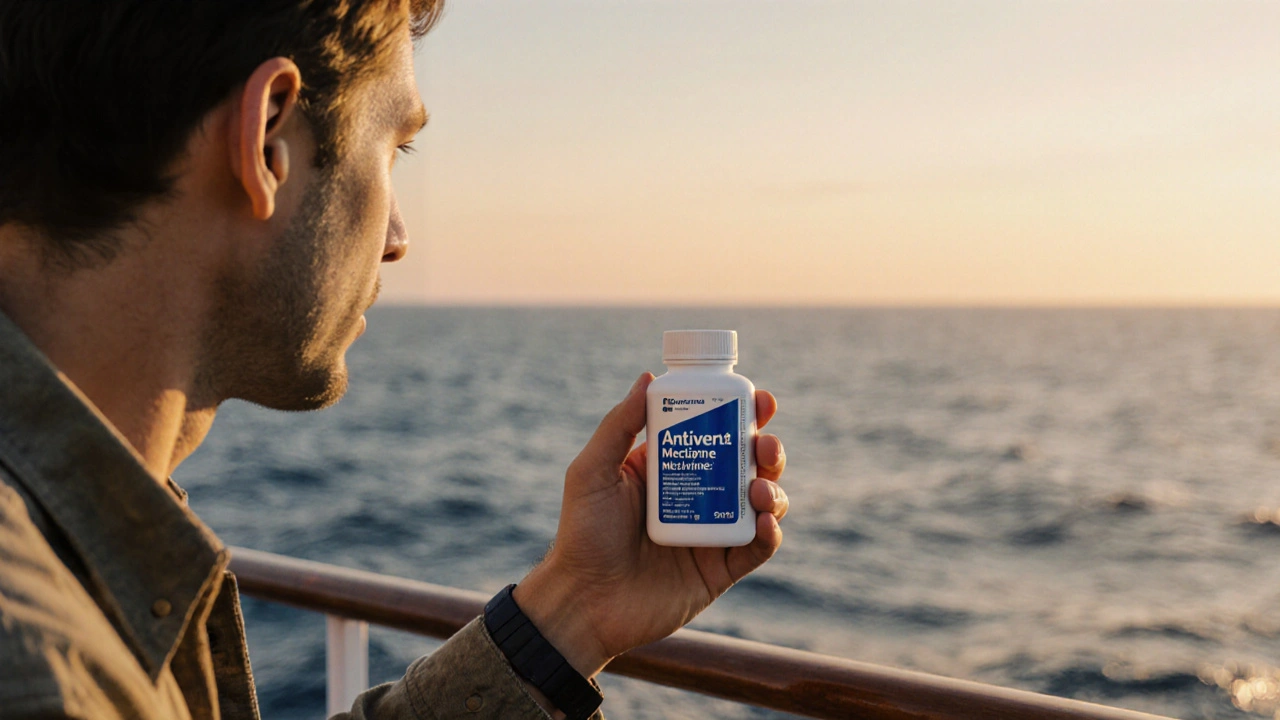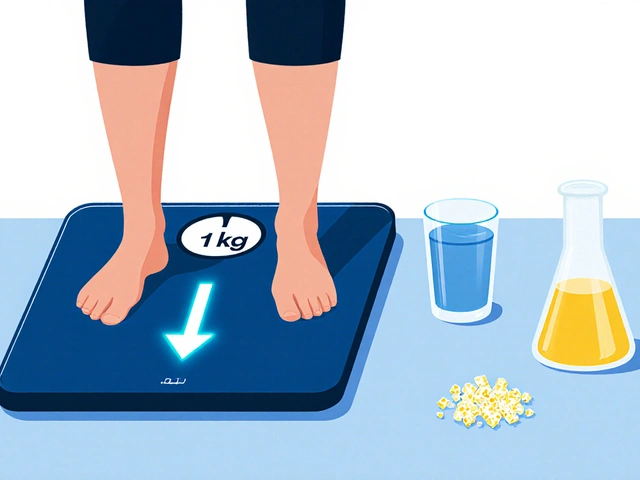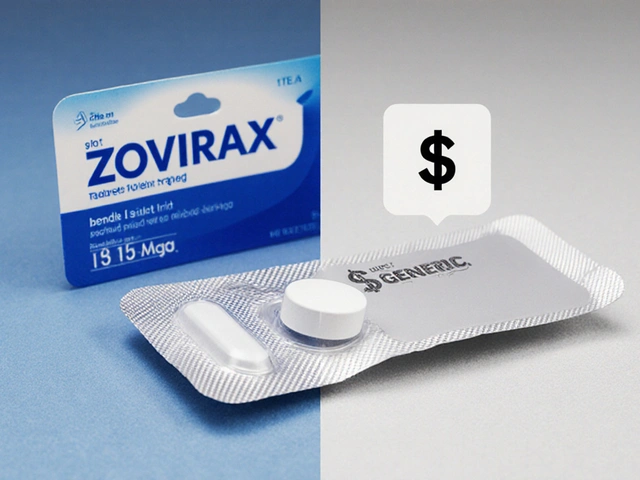
Motion Sickness Medication Finder
Get personalized recommendations for motion sickness medications based on your travel situation and sensitivity to side effects.
Feeling queasy on a boat, in a car, or after a long flight? You’re probably reaching for a pill that promises to calm the nausea. Antivert (Meclizine) is one of the most popular over‑the‑counter choices, but it isn’t the only game in town. This guide breaks down how Antivert stacks up against its main rivals, so you can pick the option that fits your body, budget, and travel style.
Key Takeaways
- Antivert works by blocking histamine receptors, delivering a long‑lasting effect with relatively mild drowsiness.
- Dimenhydrinate (Dramamine) hits faster but often makes you sleepy.
- Cyclizine offers a middle ground of moderate onset and low sedation.
- Promethazine is the strongest anti‑nausea agent but comes with higher risk of severe side effects.
- Non‑drug options like ginger or scopolamine patches can be useful for specific situations or for those who avoid medication.
What Is Antivert (Meclizine)?
Antivert is an antihistamine that also blocks acetylcholine receptors in the inner ear. By dampening the signals that trigger motion‑induced dizziness, it reduces symptoms of motion sickness and vestibular vertigo. Typical adult dosing is 25mg taken one hour before travel, with effects lasting up to 24hours. Side‑effects are usually limited to mild drowsiness, dry mouth, or blurred vision, and it’s considered safe for most adults over 12years old.
Common Alternatives to Antivert
Below are the most widely used substitutes, each with its own strengths and trade‑offs.
- Dimenhydrinate (brand name Dramamine) - an older antihistamine that acts quickly (15‑30minutes) but often causes marked sedation.
- Cyclizine - a piperazine antihistamine; onset 30‑60minutes, relatively low drowsiness.
- Promethazine - a phenothiazine used for severe nausea; powerful but can cause pronounced drowsiness, low blood pressure, and, in rare cases, respiratory depression.
- Scopolamine (transdermal patch) - blocks muscarinic receptors; effective for motion sickness lasting several days but may cause dry mouth and blurred vision.
- Ginger - a natural anti‑nausea root; works best in capsule or tea form and is favored by travelers who avoid pharmaceuticals.
Side‑Effect Profiles at a Glance
| Medication | Onset | Duration | Typical Sedation | Price (USD, per dose) |
|---|---|---|---|---|
| Antivert (Meclizine) | 1 hour | 24hours | Low‑moderate | $0.30 |
| Dimenhydrinate | 15-30min | 4-6hours | High | $0.20 |
| Cyclizine | 30-60min | 12-24hours | Low | $0.25 |
| Promethazine | 30min | 6-8hours | High | $0.40 |
| Scopolamine Patch | 4hours (after application) | 72hours | Low‑moderate | $5.00 (per patch) |
| Ginger (capsules) | 1-2hours | 4-6hours | None | $0.15 |
Choosing the Right Option for Your Situation
Not every anti‑motion‑sickness drug fits every traveler. Use the following decision matrix to narrow down the best choice.
- Long trips (24hours+) - Antivert or Cyclizine give the most prolonged coverage.
- Quick relief before a short drive - Dimenhydrinate’s fast onset is handy.
- High‑risk patients (e.g., seniors, people on sedatives) - Scopolamine patches or ginger avoid systemic drowsiness.
- Severe nausea (e.g., chemotherapy‑induced) - Promethazine is the most potent, but only under medical supervision.
- Travel with children - Antivert is approved for ages 12+, while ginger is a safe natural alternative for younger kids (consult a pediatrician).
Safety Considerations and Interactions
All antihistamines share a few red flags. Never combine multiple sedating agents (e.g., Antivert with alcohol or benzodiazepines) because the cumulative drowsiness can impair driving and increase fall risk.
Specific cautions:
- Promethazine should be avoided in patients with glaucoma or severe urinary retention.
- Scopolamine patches are contraindicated in patients with narrow‑angle glaucoma.
- Pregnant or breastfeeding women should discuss any anti‑nausea medication with their provider; ginger is generally considered safe, while antihistamines need case‑by‑case assessment.

Practical Tips for Effective Use
- Take the pill with a full glass of water - this speeds up absorption.
- If you’re prone to drowsiness, schedule the dose for times when you can rest (e.g., before a night flight).
- Store tablets in a cool, dry place; heat can degrade potency.
- For scopolamine patches, apply to a hair‑free area behind the ear and rotate sites for each new patch.
- Pair ginger capsules with a light snack; empty‑stomach consumption can cause stomach upset.
Quick Reference Cheat Sheet
- Antivert (Meclizine) - Long‑lasting, mild sedation, good for multi‑day trips.
- Dimenhydrinate - Fast acting, high drowsiness, cheap.
- Cyclizine - Moderate onset, low sedation, budget‑friendly.
- Promethazine - Strongest relief, high side‑effect risk, prescription‑only in many regions.
- Scopolamine Patch - Non‑oral, lasts up to 3 days, mild to moderate sedation.
- Ginger - Natural, zero sedation, best for mild to moderate nausea.
Frequently Asked Questions
Can I take Antivert and Dimenhydrinate together?
Combining two antihistamines rarely adds benefit and often doubles the sedation risk. It’s safer to choose one based on the timing you need.
Is Antivert safe for seniors?
Yes, but start with a half dose (12.5mg) to gauge tolerance, especially if the person already uses other sedating meds.
How does ginger compare to prescription meds?
Ginger’s anti‑nausea effect is milder, but it avoids side‑effects like drowsiness. For mild motion sickness it can be as effective as a low‑dose antihistamine.
What is the best option for cruise ship passengers?
Many cruisers prefer a scopolamine patch because it works for days without needing to remember doses, and it causes less daytime drowsiness than dimenhydrinate.
Can I use Antivert for vertigo related to inner‑ear disorders?
Yes, Antivert is frequently prescribed for benign paroxysmal positional vertigo (BPPV) and Meniere’s disease because it reduces the abnormal vestibular signals that cause dizziness.
Whether you pick Antivert, a quicker‑acting antihistamine, a transdermal patch, or a natural remedy, the key is to match the drug’s profile to your travel plan and health status. With the right choice, you’ll spend less time feeling sick and more time enjoying the journey.
Meclizine alternatives offer a spectrum of onset times, durations, and side‑effect risks-so you can customize your anti‑nausea strategy without compromising safety.
13 Comments
Stephanie Bryant
October 14, 2025 AT 10:53 AM
antivert is my go to for long flights but i always forget to take it an hour before 😅 last time i took it 10 mins before takeoff and still felt like a zombie for 6 hours. learn from my mistakes lol
Frank De Silva
October 15, 2025 AT 07:05 AM
How quaint. You all treat antihistamines like they’re artisanal tea blends. The fact that you’re even debating ginger over pharmacologically validated vestibular suppression suggests a fundamental misunderstanding of physiology. If you want to feel like a sloth on a cruise, go ahead - but don’t mistake sedation for efficacy.
Erin DeGroot
October 15, 2025 AT 13:50 PM
Frank, I hear you - but not everyone has the luxury of being able to ‘tolerate’ sedation. My grandmother takes antivert for BPPV and still drives her own car. The key isn’t just potency - it’s balance. Some of us aren’t trying to win a speedrunning contest against nausea, we’re trying to live our lives without falling over.
Leo Lee
October 15, 2025 AT 17:03 PM
Stop acting like ginger is medicine. It’s a root. If you want real relief, take something that works. You’re not ‘natural’ - you’re just delaying the inevitable nausea. And no, your ‘wellness journey’ doesn’t make you smarter than a pharmacist.
Kaitlin Crockett
October 16, 2025 AT 07:37 AM
Scopolamine patch for cruises. No question. I’ve tried everything else. Patch lasts, doesn’t make me groggy during the day, and I don’t have to remember pills.
Michael Tribone
October 16, 2025 AT 13:31 PM
Big thanks for this breakdown! I’ve been scared to try scopolamine because of the dry mouth thing, but now I’m convinced. Also, ginger tea before boarding = game changer. Anyone else use it with lemon and honey? 🍋🍵
Stephanie Cepero
October 16, 2025 AT 21:17 PM
Just wanted to say - this guide is SO helpful. I’ve been dealing with vertigo since my accident, and I didn’t realize Antivert was actually used for that too. I’ve been taking Dramamine for years thinking it was the only option… thank you for clarifying the differences. I feel less alone now.
Isabel Piaggi
October 17, 2025 AT 16:06 PM
so i tried cyclizine last month because i was tired of being a zombie after flights and wow it was a revelation like i could actually walk around the airport without needing to nap for 2 hours and the price is literally the same as dramamine so why would you ever pick the other one
Claire Battista
October 18, 2025 AT 05:06 AM
My brother’s a marine biologist and he swears by the scopolamine patch for deep-sea diving trips - says it’s the only thing that keeps him from puking over the side. He’s also the guy who refuses to take anything unless it’s ‘proven by science’ - so if he’s on board, I’m on board. 🌊🩹
Drashti patel
October 18, 2025 AT 20:03 PM
There’s something poetic about how our bodies respond to motion - a dance between ancient reflexes and modern chemistry. We reach for pills like prayers, hoping to quiet the chaos inside. But sometimes, the most profound relief comes not from blocking signals, but from accepting them - ginger, breath, stillness. The body remembers how to heal, if we just stop fighting it long enough to listen.
Tracy Blake
October 19, 2025 AT 00:01 AM
Let’s be real - we’re all just trying to avoid looking like a drunk person on a rollercoaster. Antivert lets you sip your coffee like a civilized human while your inner ear screams like a banshee. But honestly, the real MVP here is the seat by the window. No reading, no phone, just the horizon. The medicine helps, sure - but the mindset? That’s the real cure. 🌅
Tom McInnes
October 19, 2025 AT 08:33 AM
For the record, promethazine should be treated with extreme caution. I’ve seen patients in the ER after combining it with alcohol. The sedation isn’t just ‘strong’ - it’s dangerous. This guide is excellent, but please, if you’re considering it - consult a professional first.






KJ Miller
October 14, 2025 AT 05:14 AM
Honestly, I’ve been using ginger capsules for years on road trips and cruises - zero drowsiness, and my stomach actually feels better than when I took Dramamine. I used to think it was just placebo, but my mom’s been using it for vertigo too and swears by it. 🌿😊